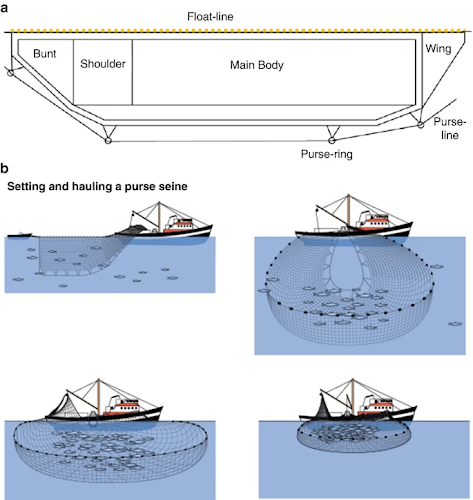Purse Seine Fishing | 26 Dec 2022
Prelims: 12 Nautical Miles, Western Coasts, Exclusive Economic Zone, State Subject.
Mains: Purse Seine Fishing Technique and its Advantage.
Why in News?
The Centre has told the Supreme Court that a ban imposed by certain coastal States on purse seine fishing, which is known to disadvantage endangered species, is not justified.
What are the Issues?
- Currently, bans on purse seine fishing are implemented in the territorial waters of Tamil Nadu, Kerala, Puducherry, Odisha, Dadra and Nagar Haveli and Daman and Diu, and the Andaman and Nicobar Islands up to 12 nautical miles.
- While States such as Gujarat, Andhra Pradesh, Goa, Karnataka, West Bengal have not imposed any such ban.
What is Purse Seine Fishing?
- About:
- A purse seine is made of a long wall of netting framed with floating and leadline and having purse rings hanging from the lower edge of the gear, through which runs a purse line made from steel wire or rope which allow the pursing of the net.
- The technique has been widely deployed on India’s western coasts.
- Advantages:
- Purse-seine fishing in open water is considered to be an efficient form of fishing.
- It has no contact with the seabed and can have low levels of by catch.
- It can also be used to catch fish congregating around fish aggregating devices
- It is used in the open ocean to target dense schools of single-species pelagic (midwater) fish like tuna and mackerel.
What are the Concerns?
- In some States, this technique linked to concerns about the decreasing stock of small, pelagic shoaling fish such as sardines, mackerel, anchovies and trevally on the western coasts.
- The scientific community argues that climatic conditions, including the El Nino phenomenon, are responsible for the declining catch of such fish in the last ten years.
- However, fishermen using traditional methods have placed the blame squarely on the rise of purse seine fishing, and fear a further fall in the availability of these small fish if the ban is lifted.
- They have also demanded that, as the Centre has supported the lifting of the ban, it should publish the expert committee report it has based its stance on.
- A major concern is the dwindling availability of oil sardines, a favourite of Kerala fish eaters.
- In 2021, Kerala recorded a catch of just 3,297 tonnes of sardine, a sharp decrease from the haul of 3.9 lakh tonnes in 2012.
- Purse seine is a non-targeted fishing gear and catches all sorts of fishes which come in the way of the net, including juveniles. Hence, they are very much detrimental to marine resources.
What is the Union Government's Argument Against Ban?
- The Union Ministry of Fisheries, Animal Husbandry and Dairying has recommended the lifting of the ban on purse seine fishing on a report submitted by an expert committee.
- The expert panel has said that this mode of fishing “per se has not resulted in any serious resource depletion so far, given the available evidence”.
- The expert panel has recommended purse seiners to fish in territorial waters and the Indian Exclusive Indian Exclusive Economic Zone (EEZ) subject to certain conditions.
- The committee has also suggested the framing of a “national management plan on purse seine fisheries.
What is the Jurisdiction of Fishing?
- Fishing is a state subject and the management plan for marine fisheries in territorial waters is the job of the State.
- State subject consists of 61 subjects (originally 66 subjects).
- These are of local importance such as, local government, public order and police, agriculture, forest, public health and sanitation, fisheries, education, State taxes and duties. The states under normal circumstances have exclusive power to make laws on subjects mentioned in the State List.

